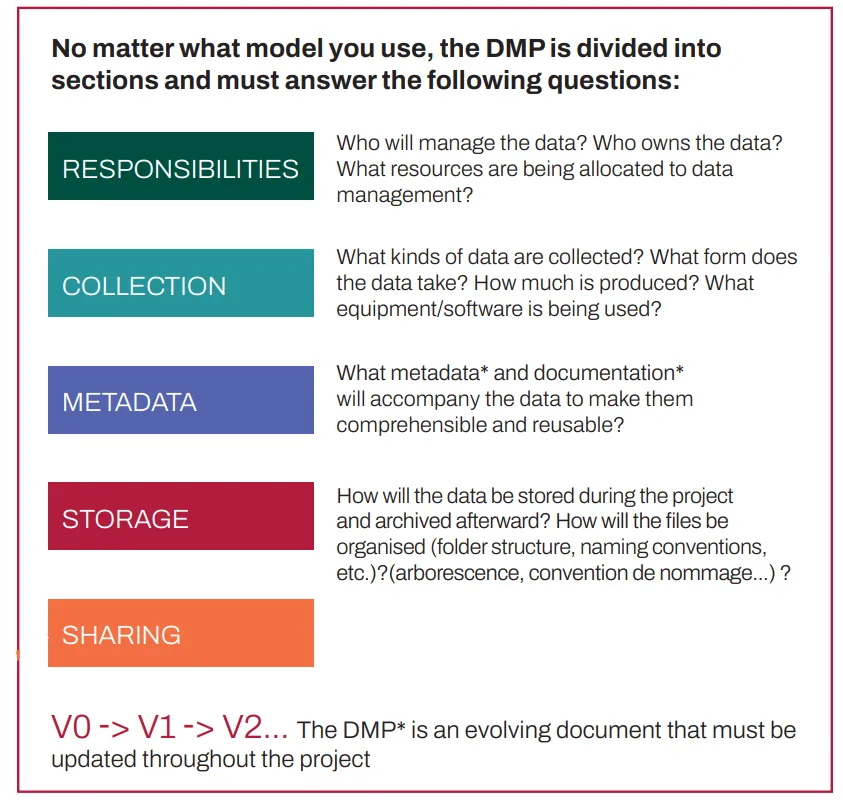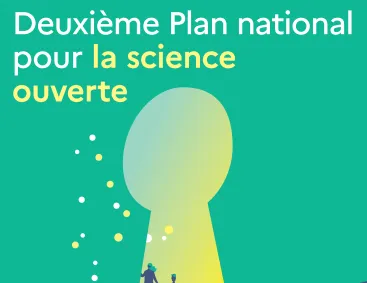Services throughout the data lifecycle
Support for research data management is offered at the various stages of the data lifecycle.
This diagram shows the stakeholders at the École who can help you manage your data, depending on your questions and needs:
- Research promotion services: the Research Partnership and Promotion Department (DPRV) and Centrale Innovation
- The Michel Serres library's research services team
- The Centrale Lyon computing center team, the PMCS2I
- The defense and security officer (FSD)
- The data protection officer (DPO)
Data management plans
The data management plan (DMP) is the main document in a research data management approach.
Its aim is to describe how the research data generated and/or reused will be managed during and after the research project. As such, it covers the entire data lifecycle, addressing issues of data collection, documentation, storage, sharing and archiving.
It is a mandatory deliverable in most publicly-funded projects: ANR, Horizon Europe, ADEME... because it enables you to anticipate, right from the start of a project, the good practices that will enable you to produce comprehensible and reusable data.
We offer you support, whatever the context of your research (project ANR, European, thesis, partnered research...):
- General presentation of what is expected from a data management plan and any obligations linked to funding.
- Personalized appointments for filling in the various sections of the data management plan.
- Reading of the data management plan.
- Presentation of the data management plan writing tool DMP Opidor, which displays Centrale Lyon-specific recommendations for each question.
FAIRization of data
The aim of data management and sharing practices is to make data "FAIR", i.e. Easy to Find, Accessible, Interoperable and Reusable. Urfist Méditerranée offers, on the Doranum website, a description of these four principles and the good practices they cover.
Among these, we can cite:
- the choice and use of metadata;
- the choice and use of controlled vocabularies to describe the data;
- the documentation of the data collection, processing and analysis workflow;
- the choice of a data warehouse to disseminate the data;
- the assignment of a permanent identifier such as the DOI to datasets;
- the choice of a reuse license assigned to the data.
Legal support
Data sharing and openness is the 2nd axis of the National plan for open science 2021-2024, which aims in particular to "implement the obligation to disseminate publicly funded research data". French law is already aligned with this objective, since "completed" data produced by research and teaching establishments as part of their public service mission are considered administrative documents and, as such, are subject to the principles of online dissemination by default and freedom of access (see the legal guide available at ouvrirlascience.fr). This general principle is subject to exceptions.
These concern in particular:
- personal data;
- data from restricted areas (ZRR) and data relating to the Nation's scientific and technical potential;
- data protected by copyright or intellectual property rights;
- data originating from a third party;
- data covered by business secrecy.
It is vital to raise and deal with questions of data ownership and sharing right from the start of the project : these issues must be settled in the consortium agreement or partnership contract, and carried over into the data management plan. As soon as you launch a project involving one or more partners, whether academic or industrial, get in touch with Centrale Lyon's Research Partnership and Promotion Department ( DPRV - Contact ) to help you deal with these issues.
Shared digital infrastructures
The storage of research data must obey a number of principles and rules:
- Prefer secure institutional storage solutions (laboratory or institution); avoid private storage solutions such as Dropbox or Google Drive.
- Apply the 3-2-1 rule: 3 copies of your data stored on at least 2 different media and with a remote copy (e.g. institutional server), to avoid data loss.
- Directories and files must be clearly named and organised in accordance with common good practice.
- At the end of a project, sort data: archive those intended for long-term storage and delete those that will no longer be useful.
The École Centrale de Lyon has centralised storage spaces for research projects. To access them, visit the site du Pôle de Calcul PMCS2I. Here you can request the creation of an account with the computing center. You will then be able to request storage via the ticket interface at Centrale Lyon.
These storage spaces, created as part of the 2nd Open Science Roadmap , are intended to complement, within the framework of identified research projects (ANR, Horizon Europe, ADEME, thesis...), the storage offer available within the laboratories.
They enable, via the creation of accounts, shared access to datasets, with colleagues from Centrale Lyon or external partners.
These spaces are allocated for the duration of the project; at the end of the project, the data to be kept must be selected and archived. Others will be deleted.
For code and software, Centrale Lyon provides researchers with a Gitlab. This can be accessed with your Centrale Lyon login.
For numerical simulation, experimental or numerical data processing and visualisation, Centrale Lyon provides you with a shared Computing Hub, the PMCS2I.
The latter has data processing software ( Liste de ces logiciels spécifiques.)
Once any legal obstacles to data dissemination have been removed, it's time to decide how to open up the data:
- Which data warehouse to choose?
- What type of access (free or restricted)?
- What reuse license to choose?
- What information to share to make the data understandable and reusable?
The Doranum website provides a number of answers to these questions regarding data warehouses, reuse licenses, ways to facilitate access to its datasets, and questions to ask before sharing one's data.
In the event that there is no thematic/disciplinary warehouse adapted to your needs, it is recommended that you share your data via the espace Data Centrale Lyon sur l'entrepôt Recherche Data Gouv. The latter, created as part of the 2nd National Plan for Open Science, is a sovereign publishing solution for sharing and opening up data. It is intended for research communities that do not yet have a recognized thematic repository.
The curation of deposited datasets is handled by Centrale Lyon's Research Services team - "Research Services - Data Management" form.
A distinction needs to be made between the storage of "hot" data, for the duration of the project, and the long-term archiving of "cold" data, at the end of the project.
Thus, storage is not intended to be perennial, unlike archiving. At the end of a research project, it is therefore necessary to select the data intended for archiving, and those which, conversely, can be deleted. This sorting and selection phase is all the more important given that the energy consumption issues associated with data storage make systematic preservation on principle untenable.
As part of a collaboration with IN2P3's Centre de calcul, located at La Doua, Centrale Lyon's Pôle de calcul is offering researchers archiving on magnetic tape of their data stored on institutional spaces.
This archiving request can be made via Centrale Lyon's ticket interface.

Have a question? Please contact us!
For all your questions about research data: Form "Research Services - Data Management"





